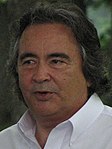Detailed results
[3]
Addison
Incumbent Democrats Claire Ayer, who has represented the Addison district since 2003, and Christopher Bray, who has represented the Addison district since 2013, were re-elected.
Bennington
Incumbent Democrats Dick Sears, who has represented the Bennington district since 1993, was re-elected. Incumbent Democrat Robert Hartwell, who has represented the Bennington district since 2007, retired. Fellow Democrat Brian Campion won the open seat.
Caledonia
Incumbent Democrat Jane Kitchel, who has represented the Caledonia district since 2005, and incumbent Republican Minority Leader Joe Benning, who has represented the Caledonia district since 2011, were both re-elected.
Chittenden
Incumbent Democrats Ginny Lyons, who has represented the Chittenden district since 2001, Tim Ashe, who has represented the Chittenden district since 2009, Phil Baruth, who has represented the Chittenden district since 2011, and Michael Sirotkin, who has represented the Chittenden district since 2014, were all re-elected. Progressive David Zuckerman, who has represented the Chittenden district since 2013, and Incumbent Republican Diane Snelling, who has represented the Chittenden district since 2003, were also re-elected.
Essex-Orleans
Incumbent Democrats Robert Starr, who has represented the Essex-Orleans district since 2005, and John Rodgers, who has represented the Essex-Orleans district since 2013, were both re-elected.
Franklin
Incumbent Republican Norm McAllister, who has represented the Franklin district since 2013, was re-elected. Incumbent Democrat Donald Collins, who has represented the Franklin district since 2013, retired. Republican Dustin Degree won the open seat.
Grand Isle
Incumbent Democrat Richard Mazza, who has represented the Grand Isle district since 1985, was re-elected.
Lamoille
Incumbent Republican Richard Westman, who has represented the Lamoille district since 2011, was re-elected.
Orange
Incumbent Democrat Mark MacDonald, who has represented the Orange district since 2003, was re-elected.
Rutland
Incumbent Republicans Peg Flory, who has represented the Rutland district since 2011, and Kevin Mullin, who has represented the Rutland district since 2003, were both re-elected. Incumbent Democrat Eldred French, who has represented the Rutland district since 2013, lost re-election to Republican Brian Collamore won the open seat.
Washington
Incumbent Republican Bill Doyle, who has represented the Washington district since 1969, incumbent Democrat Ann Cummings, who has represented the Washington district since 1997, and incumbent Progressive Minority Leader Anthony Pollina, who has represented the Washington district since 2011, were all re-elected.
Windham
Incumbent Democrat Jeanette White, who has represented the Windham district since 2003, was re-elected. Incumbent Democrat Peter Galbraith, who has represented the Windham district since 2011, retired. Fellow Democrat Becca Balint won the open seat.
Windsor
Incumbent Democrats Alice Nitka, who has represented the windsor district since 2007, and Richard McCormack, who has represented the Windsor district since 2007, and Senate President pro tempore John Campbell, who has represented the Windsor district since 2001, were re-elected.
- ↑ Not counting Progressive and Republican candidates who were also nominated by the Democratic Party
- ↑ Not counting Democratic candidates who were also nominated by the Republican Party
- ↑ Not counting Democratic candidates who were also nominated by the Progressive Party
- 1 2 Running as "Democratic/Republican"
- 1 2 Running as "Progressive/Democratic"
- ↑ Running as "Democratic/Progressive"
This page is based on this
Wikipedia article Text is available under the
CC BY-SA 4.0 license; additional terms may apply.
Images, videos and audio are available under their respective licenses.




